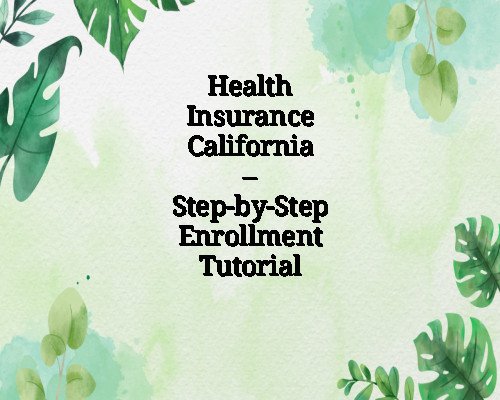Health Insurance California – Step-by-Step Enrollment Tutorial
Learn how to enroll in health insurance in California with this easy, step-by-step guide to understanding your options, costs, and coverage under Covered California.
Understanding Health Insurance in California
Health insurance in California is available through multiple channels, but the primary marketplace for individuals and families is Covered California, the state’s official health insurance exchange. This platform was established under the Affordable Care Act (ACA) to make it easier for residents to compare plans and receive financial help.
Whether you’re self-employed, unemployed, or simply exploring better coverage, enrolling through Covered California gives you access to subsidized plans from private insurers, along with Medi-Cal if you qualify based on income.
Step 1: Know Your Enrollment Periods
Open Enrollment Period (OEP)
This is the main time when anyone can apply for a new plan or switch existing plans. In California, the open enrollment period usually runs:
-
From November 1 to January 31
Special Enrollment Period (SEP)
Outside the open enrollment period, you can still apply if you experience a qualifying life event, such as:
-
Loss of previous health insurance
-
Marriage or divorce
-
Birth or adoption of a child
-
Change in immigration status
-
Moving to a new residence
You generally have 60 days from the date of the qualifying event to enroll.
Step 2: Gather Required Information
Before starting the application process, collect the following:
-
Social Security numbers or immigration documents for all applicants
-
Income information (pay stubs, tax returns, W-2s)
-
Employer details
-
Current health insurance policy numbers (if applicable)
-
Information about employer-sponsored insurance offers
Step 3: Create a Covered California Account
Visit www.coveredca.com and click “Apply” to start.
To register:
-
Provide your name, date of birth, and contact details
-
Create a username and password
-
Set security questions for account recovery
Once your account is verified via email or text, log in to begin your application.
Step 4: Complete the Application
You’ll be guided through several pages where you’ll enter:
-
Household size and composition
-
Estimated annual income
-
Citizenship or immigration status
-
Whether anyone is eligible for other coverage
Income Verification
Income determines your eligibility for:
-
Premium Assistance: Monthly premium discounts
-
Cost-Sharing Reductions: Lower out-of-pocket costs
-
Medi-Cal: Free or low-cost health coverage for low-income residents
Step 5: Get Your Eligibility Results
After submitting your application, you’ll immediately see your eligibility for:
-
Medi-Cal
-
Private health plans with premium subsidies
-
Other public programs, if applicable
If eligible for Medi-Cal, you may be automatically routed to your county’s human services department to complete enrollment.
Step 6: Compare Plans
You’ll see a list of available health plans sorted by metal tiers:
Bronze
-
Lowest monthly premiums
-
Highest out-of-pocket costs
-
Good for infrequent medical needs
Silver
-
Moderate premiums and out-of-pocket costs
-
Best tier for cost-sharing reductions (if eligible)
Gold
-
Higher premiums
-
Lower out-of-pocket costs
Platinum
-
Highest premiums
-
Lowest costs when receiving care
You can compare plans based on:
-
Monthly premium
-
Deductible
-
Out-of-pocket maximum
-
Provider network (doctors and hospitals)
-
Drug coverage
Step 7: Choose and Enroll in a Plan
Once you find the best fit, click “Select Plan” to proceed. You’ll need to:
-
Confirm your plan selection
-
Choose a payment method for your premium
-
Set up automatic payments, if desired
First Premium Payment
Enrollment is not complete until you pay the first premium. You’ll receive instructions to pay online or by mail, depending on your selected insurer.
Step 8: Confirm and Track Your Enrollment
Covered California will send a confirmation email and/or physical welcome packet. You can track your application status under your account dashboard.
If any documents are required to verify your income, citizenship, or other details, you’ll get alerts through your account. Upload documents promptly to avoid delays or cancellations.
Step 9: Understand Your Coverage
After enrollment, your plan starts on the first of the next month (or the month after, depending on when you applied). Here’s what to do next:
-
Review your Summary of Benefits and Coverage (SBC)
-
Learn how to use your plan for doctor visits, prescriptions, and emergency care
-
Set up an online member account with your insurance company
-
Choose a primary care doctor (if your plan requires it)
-
Request your member ID card (usually mailed or available online)
Step 10: Maintain or Update Your Coverage
Life changes? You must report changes to Covered California within 30 days, including:
-
Income changes
-
Household size updates
-
Address change
-
Loss of job or insurance
This ensures you get the correct subsidy amount or remain eligible for coverage.
Additional Tips
Auto-Renewal
Covered California automatically renews your plan each year unless you make changes. However, you should review your plan annually to:
-
Adjust income estimates
-
Shop for better rates or coverage
-
Update personal information
Avoiding Penalties
While California no longer imposes a federal penalty for being uninsured, the state of California does. You may face a state tax penalty if you don’t have health insurance for most of the year.
Alternative Coverage Options
If Covered California isn’t the right fit, consider:
-
Employer-Sponsored Insurance: If available, this is usually more cost-effective
-
Private Health Insurance Brokers: Offer off-exchange plans without subsidies
-
Medi-Cal: Available year-round for low-income individuals, with no monthly premiums
-
Student Health Plans: For college/university students, often affordable and comprehensive
Final Thoughts
Enrolling in health insurance through Covered California is a straightforward process when you understand the steps. From account creation to plan selection and ongoing maintenance, each phase is designed to ensure Californians have access to affordable, quality health care.
Staying informed, acting during open enrollment or after qualifying events, and keeping your application updated will help you get the coverage you need while avoiding unnecessary penalties or interruptions in care.

